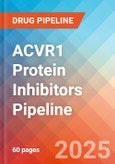ACVR1 protein inhibitors Understanding
ACVR1 protein inhibitors: Overview
The human activin A receptor type I (ACVR1) gene also known as ALK2, is located in chromosome 2q23-q24 and encodes for the 509 amino acid protein. Activin A receptor type I (ACVR1) encodes for a bone morphogenetic protein type I receptor of the TGFβ receptor superfamily. It is involved in a wide variety of biological processes, including bone, heart, cartilage, nervous, and reproductive system development and regulation. Moreover, ACVR1 has been extensively studied for its causal role in fibrodysplasia ossificans progressiva (FOP), a rare genetic disorder characterised by progressive heterotopic ossification. ACVR1 is linked to different pathologies, including cardiac malformations and alterations in the reproductive system. The first small molecule inhibitor of ALK2 was dorsomorphin, identified through a classical BMP ventralization assay in zebrafish embryos. Despite being an amenable drug target, little has been done to-date to systematically evaluate the role of ACVR1 in Diffuse intrinsic pontine glioma (DIPG), nor to screen currently available inhibitors in patient-derived tumour models.Report Highlights
The companies and academics are working to assess challenges and seek opportunities that could influence ACVR1 protein inhibitors R&D. The therapies under development are focused on novel approaches for ACVR1 protein inhibitors.ACVR1 protein inhibitors Emerging Drugs Chapters
This segment of the ACVR1 protein inhibitors report encloses its detailed analysis of various drugs in different stages of clinical development, including phase III, II, I, preclinical and Discovery. It also helps to understand clinical trial details, expressive pharmacological action, agreements and collaborations, and the latest news and press releases.ACVR1 protein inhibitors Emerging Drugs
Momelotinib: Sierra Oncology
Momelotinib is a potent, selective and orally-bioavailable JAK1, JAK2 & ACVR1 inhibitor with a differentiated therapeutic profile in myelofibrosis (MF). Sierra has launched MOMENTUM, a randomized double-blind Phase 3 clinical trial designed to enroll 180 myelofibrosis patients who are symptomatic and anemic, and who have been treated previously with a JAK inhibitor. The U.S. Food and Drug Administration has granted Fast Track designation to momelotinib. Momelotinib is protected by numerous issued patents and pending applications globally, with patent exclusivity potentially extending to 2040.BLU-782: Turning Point Therapeutics
BLU-782 is an orally administered, potent and highly selective ALK2 inhibitor. It was designed specifically to target the underlying genetic driver of fibrodysplasia ossificans progressiva (FOP), a rare, severely disabling and ultimately life-shortening genetic disease. FOP is characterized by episodic soft tissue edema (flare-ups), and the progressive replacement of skeletal muscle, ligaments and connective tissue by heterotopic bone. FOP is caused by a gain-of-function mutation in ACVR1, which encodes activin-like kinase 2 (ALK2).ACVR1 protein inhibitors: Therapeutic Assessment
This segment of the report provides insights about the different ACVR1 protein inhibitors drugs segregated based on following parameters that define the scope of the report, such as:Major Players working on ACVR1 protein inhibitors
There are approx. 6+ key companies which are developing the ACVR1 protein inhibitors. The companies which have their ACVR1 protein inhibitors drug candidates in the most advanced stage, i.e. Phase III include, Sierra Oncology.Phases
The report covers around 9+ products under different phases of clinical development like
- Late-stage products (Phase III and
- Mid-stage products (Phase II and
- Early-stage products (Phase I/II and Phase I) along with the details of
- Pre-clinical and Discovery stage candidates
- Discontinued & Inactive candidates
Route of Administration
ACVR1 protein inhibitors pipeline report provides the therapeutic assessment of the pipeline drugs by the Route of Administration. Products have been categorized under various ROAs such as- Infusion
- Intradermal
- Intramuscular
- Intranasal
- Intravaginal
- Oral
- Parenteral
- Subcutaneous
- Topical
Molecule Type
Products have been categorized under various Molecule types such as
- Vaccines
- Monoclonal Antibody
- Peptides
- Polymer
- Small molecule
Product Type
Drugs have been categorized under various product types like Mono, Combination and Mono/Combination.ACVR1 protein inhibitors: Pipeline Development Activities
The report provides insights into different therapeutic candidates in phase III, II, I, preclinical and discovery stage. It also analyses ACVR1 protein inhibitors therapeutic drugs key players involved in developing key drugs.Pipeline Development Activities
The report covers the detailed information of collaborations, acquisition and merger, licensing along with a thorough therapeutic assessment of emerging ACVR1 protein inhibitors drugs.ACVR1 protein inhibitors Report Insights
- ACVR1 protein inhibitors Pipeline Analysis
- Therapeutic Assessment
- Unmet Needs
- Impact of Drugs
ACVR1 protein inhibitors Report Assessment
- Pipeline Product Profiles
- Therapeutic Assessment
- Pipeline Assessment
- Inactive drugs assessment
- Unmet Needs
Key Questions
Current Scenario and Emerging Therapies:
- How many companies are developing ACVR1 protein inhibitors drugs?
- How many ACVR1 protein inhibitors drugs are developed by each company?
- How many emerging drugs are in mid-stage, and late-stage of development for the treatment of ACVR1 protein inhibitors?
- What are the key collaborations (Industry-Industry, Industry-Academia), Mergers and acquisitions, licensing activities related to the ACVR1 protein inhibitors therapeutics?
- What are the recent trends, drug types and novel technologies developed to overcome the limitation of existing therapies?
- What are the clinical studies going on for ACVR1 protein inhibitors and their status?
- What are the key designations that have been granted to the emerging drugs?
Key Players
- Sierra Oncology
- Incyte Corporation
- Blueprint Medicines
- Sumitomo Dainippon Pharma Oncology
- Daiichi Sankyo Company
- Keros Therapeutics
- BioCryst Pharmaceuticals
Key Products
- Momelotinib
- INCB 000928
- BLU 782
- Itacnosertib
- DS 6016
- KER 047
- KTI mAb 2.1
- KTI 2338
- BCX 9499
- BCX 9250
This product will be delivered within 1-3 business days.
Table of Contents
Companies Mentioned (Partial List)
A selection of companies mentioned in this report includes, but is not limited to:
- Sierra Oncology
- Incyte Corporation
- Blueprint Medicines
- Sumitomo Dainippon Pharma Oncology
- Daiichi Sankyo Company
- Keros Therapeutics
- BioCryst Pharmaceuticals








